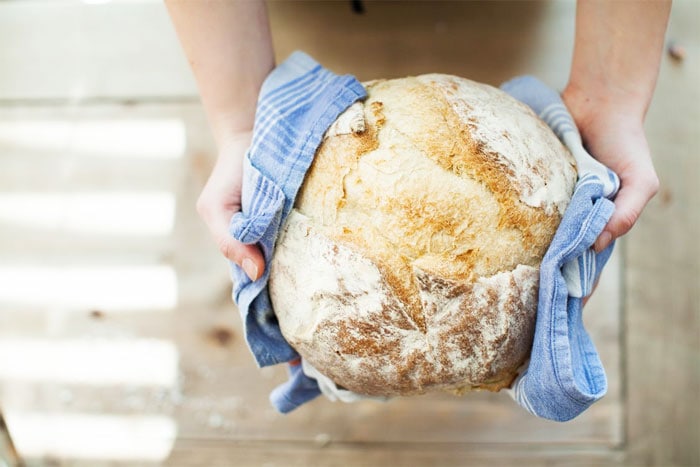Inflammatory Bowel Disease IBD, including Crohn’s Disease and ulcerative colitis, is an inflammation of the intestines. These diseases cause the intestines to form ulcers and become inflamed, scarred and easy to bleed. The most common symptoms are diarrhea, acute abdominal pain, cramping, fever and fatigue. Diet and nutrition is very important in IBD management to prevent malnutrition and extreme weight loss.

Inflammatory Bowel Disease IBD Diet (Crohn’s Diet)
- Drink lots of fluid (8 – 10 servings daily) to keep body hydrated and prevent constipation
- Your doctor or your registered dietitian may recommend a daily multivitamin-mineral supplement to replace lost nutrients
- Eat a high fiber diet when IBD is under control. Click here for a list of high fiber foods. Some patients find cooking and steaming the vegetables more tolerable than eating them raw
- During a flare up, however, limit high fiber foods and follow a low fiber diet or even a low residue diet to give the bowel a rest and minimize symptoms. Click here for a list of low fiber foods.
- Avoid lactose-containing foods such as dairy if you are lactose intolerance. Otherwise, you may use lactase enzymes and lactase pretreated foods.
- It is very important to continue nourishing your body even during a flare-up. Try small frequent meals. Eating a high protein diet with lean meats, fish and eggs, may help relieve symptoms of IBD. Your registered dietitian may recommend pre-digested nutritional drinks (elemental diet) to give your bowel a rest and replenish lost nutrients so that your body can repair itself
- Limit caffeine, alcohol and sorbitol (a type of sweetener) as these may exacerbate IBD symptoms. Click here for a list of food products containing sorbitol
- Limit gas-producing foods such as cabbage-family vegetables (broccoli, cabbage, cauliflower and brussels sprouts), dried peas and lentils, onions and chives, peppers and carbonated drinks
- Reduce fat intake if part of the intestines has been surgically removed. High fat foods usually cause diarrhea and gas for this group of patients
- If the ileum (part of the small intestines) has been resected, a Vitamin B12 injection may be required
- Some studies found that fish oil and flax seed oil may be helpful in managing IBD. Some also suggested the role of prebiotics such as psyllium in the healing process. Furthermore, probiotics (live culture) may also be helpful in aiding recovery of the intestines.
Don’t Confuse IBD with IBS
Irritable Bowel Syndrome IBS Diet and Nutrition
Irritable Bowel Syndrome (IBS) is more prevalent than we think. The primary symptom of IBS is abdominal pain and cramp after eating – resulting in diarrhea, constipation, gas or bloating. Some may find mucous in the feces. These symptoms usually persist for at least 90 days before an IBS diagnosis is considered. Most people only have mild symptoms, and fortunately, a proper diet can usually minimize symptoms. Although IBS may show similar symptoms to IBD, they are very different issues.
- Eat small frequent meals
- Drink lots of fluid (8 – 10 servings daily)
- Eat a high fiber diet. Click here for a list of high fiber foods. Your doctor may also suggest laxative with psyllium to alleviate constipation or reduce diarrhea
- A low fat diet will also help to decrease contractions of the intestines right after meals
- Limit caffeine, alcohol and sorbitol (a type of sweetener) as these may exacerbate symptoms. Click here for a list of food products containing sorbitol
- Exclude gas-producing foods such as cabbage-family vegetables (broccoli, cabbage, cauliflower and brussels sprouts), dried peas and lentils, onions and chives, peppers and carbonated drinks
- Avoid chewing gum as more air may be swallowed
- If you have diarrhea right after eating dairy, you are probably only lactose intolerance.
- Some patients find peppermint helpful. Peppermint is a natural anti-spasmodic that relaxes smooth muscles in the intestines. If you are taking peppermint supplements, try the enteric coated capsules as they may cause heartburn. Be sure to discuss with your doctor before taking any herbal supplements.
Alumni: University of British Columbia – Gloria Tsang is the author of 6 books and the founder of HealthCastle.com, the largest online nutrition network run by registered dietitians. Her work has appeared in major national publications, and she is a regularly featured nutrition expert for media outlets across the country. The Huffington Post named her one of its Top 20 Nutrition Experts on Twitter. Gloria’s articles have appeared on various media such as Reuters, NBC & ABC affiliates, The Chicago Sun-Times, Reader’s Digest Canada, iVillage and USA Today.


